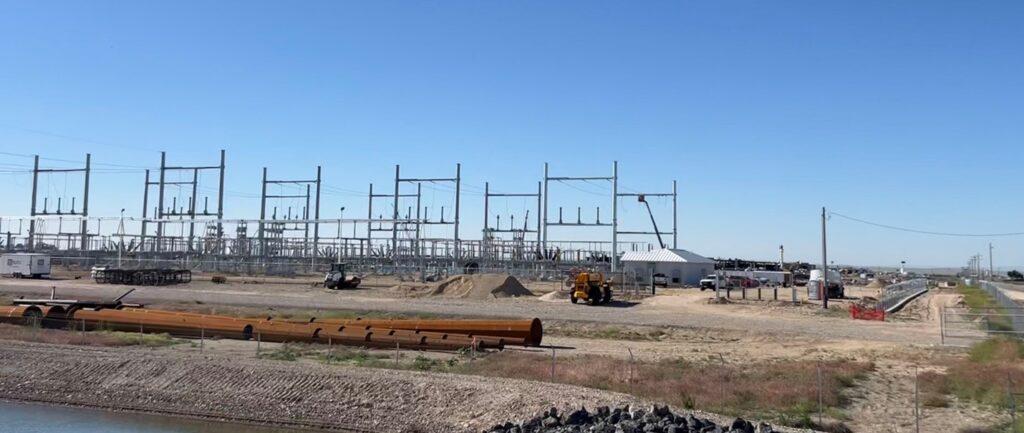Our guest contributor this month is Professor Daniel Rush, Associate Professor of Information Technology Management at Boise State University’s College of Business and Economics.
Read more about Professor Rush’s work here.
In business, project managers are trained to mind the trade-offs between a project’s schedule, cost, and scope. Sustainability managers focus on the trade-offs between people, profits, and the planet. So what factors are at play when a business launches a project that has explicit sustainability goals?
Meta’s Data Center
Let’s consider a local case study that, when announced, was the most expensive construction project in the state at $800 million. The business is Meta (formerly known as Facebook), the project is a data center, (Source: KTVB article on Meta to build $800 million data centers in Kuna) and the sustainability goals include being powered by 100% renewable energy and “restor[ing] more water than we consume” to the local watershed. First, the project’s scope goals were initially to build a 960,000 square foot data center (think warehouse for computers accessible over the internet) that would help power the ‘metaverse’ (a proprietary virtual reality space where avatars of people and businesses could interact with each other and computer-generated content). This vision was so important to the company and its founder Mark Zuckerberg, that the name of the company was changed from Facebook to Meta in 2021.

Project Goals + Sustainability
The data center’s initial budget was estimated at $800 million and when the project was announced in February of 2022, the schedule called for the project to be completed in 2025. In addition to these traditional project management concerns, the project included several sustainability elements meant to further Meta’s goals to balance its commitment to people, profits, and the planet. For instance, Meta sought to gain the support of people in the community by negotiating with the city of Kuna to build water and sewer systems for an estimated $50 million, turning the ownership and operation over to the city once it was complete. This would allow the city to entice more businesses to the area, growing its industrial tax base. The project incorporated several elements to reduce its impact on the planet. One was to meet the data center’s considerable power needs (Source: Boisedev article on Meta and Idaho Power collaboration for renewable energy in Kuna data centers) exclusively from newly-built renewable energy installations (Source: Idaho Business Review article on solar system in Kuna data centers) like solar and wind. Another was to pursue LEED Gold certification, and a third was to reduce water consumption while also sponsoring water restoration projects elsewhere in the watershed (e.g. over a dozen miles away near Barber Valley).

Project Dynamics: Change is the Norm
As the project progressed, many of the elements these managers are responsible for flexed and changed, as is common. First, the introduction of ChatGPT in November of 2021 led to a rise in demand for AI, specifically large language models (LLMs). The data center’s scope expanded to better meet the computing needs of AI; this change necessitated a schedule extension. With a new timeline came a new budget, with the new publicly reported cost of $900 million (Source: Boisedev article on Kuna data centers aerial view). External stakeholders also started to play a part in the project. First, some of the people in the surrounding community raised objections to the use of their scarce water resources (Source: KTVB article on Meta data centers controversy in Kuna) for non-agricultural or domestic purposes. Others objected to the conversion of farms or grazing rangeland from agricultural use into solar and wind power-generation installations. Meta’s pre-work on treating and restoring water helped answer the first criticism, and the opposition to solar and wind didn’t really get off the ground until after the Ada County solar installation that is to power Meta’s site was already approved. Other power developers in the area, however, face pushback from local communities, with one project in neighboring Canyon County being recently denied (Source: Boisedev article on Ada County rejection of solar farm proposal). An unexpected reaction came from another group interested in the data center: Idaho state legislators whose tax breaks for data centers were likely part of what attracted Meta to build in Idaho. By combining that tax break with another city-planning tool, the urban renewal district, the city of Kuna earned the disfavor of some legislators (Source: BoiseDev article on bill preventing data centers in Kuna). In 2023, the state legislature passed a law to prevent combining such tax breaks with urban renewal districts (Source: Idaho Reports & Aol article on bill passed to exclude data centers from urban renewal area).
Lessons Learned
The future of Kuna’s desired industrial expansion is now uncertain, but that won’t hinder the data center’s completion. Project managers are familiar with addressing a mix of stakeholders who support, are indifferent to, or oppose a project. Similarly, pursuing profits while responsibly stewarding the planet’s resources and managing how your business’ actions affect people is the reason sustainability managers have a job. Both can involve balancing objectives amid thorny issues, as our brief review of this case shows. Proper planning and execution can go far towards eventual project and sustainability success.
In coming articles, we will explore Idaho’s primary sources of carbon emissions—transportation and agriculture—and provide a comprehensive overview of their contributions to the state’s carbon footprint. Additionally, we will discuss effective strategies for reducing these emissions. Have any questions or want to know more about this Meta project? Please reach out to Prof. Rush at danrush@boisestate.edu or COBE Ethics Chair at COBEEthics@boisestate.edu.